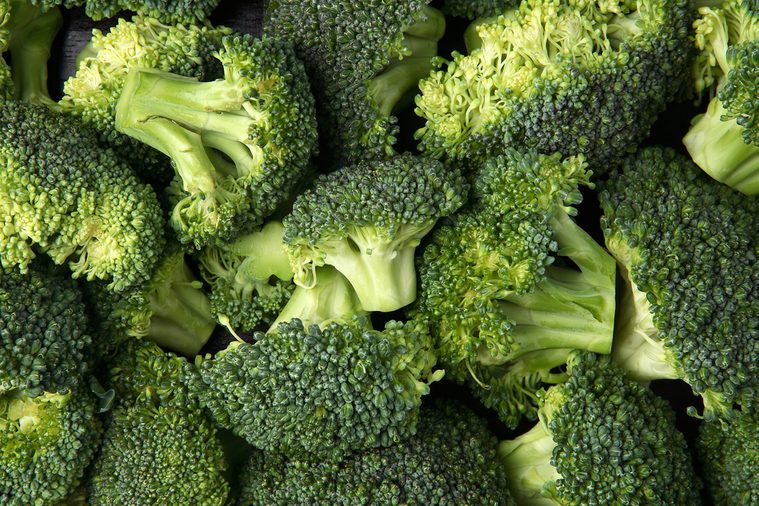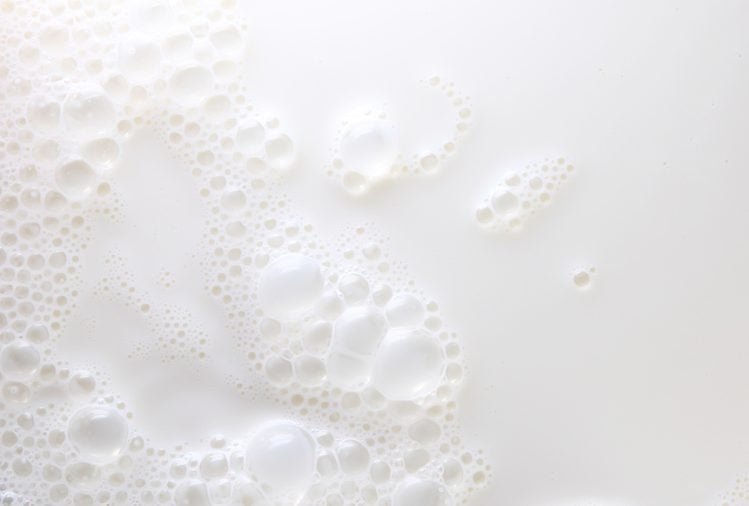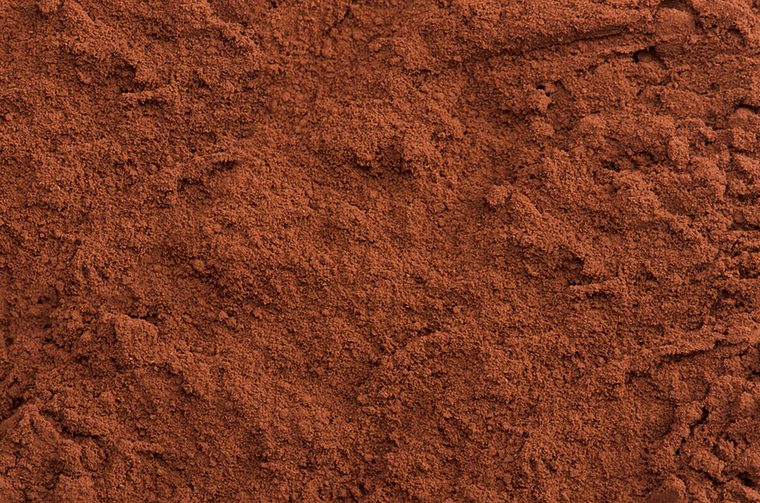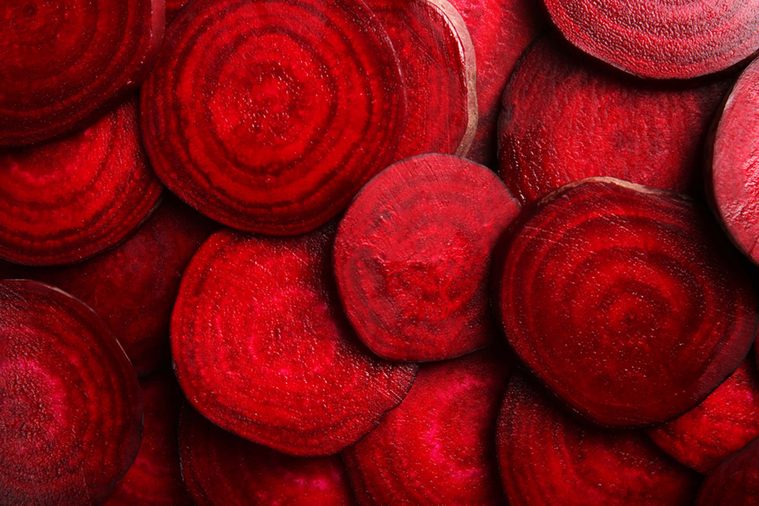
Brain-boosting foods
Following a healthy and well-balanced diet is good for you physically, and it’s also beneficial for your brain health. Certain foods contain nutrients that help keep the brain healthy, including healthy fats, fiber, protein, vitamins, and antioxidants. These nutrients may enhance memory and concentration and even offer protective effects against brain diseases, including Alzheimer’s and dementia.
Read on to reap the brain-boosting benefits of these 25 nutrient-dense foods. (Plus, 33 healthy foods that are more nutritious than you realized.)
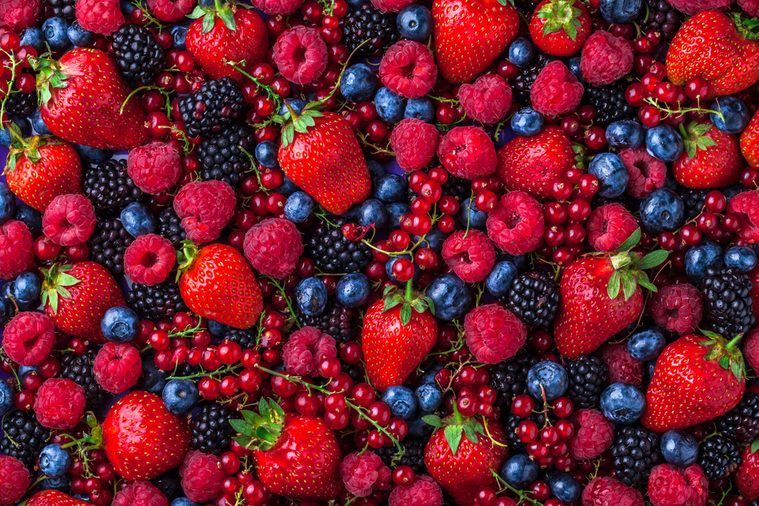
Berries
Strawberries, blueberries, and blackberries contain antioxidant properties that boost your health and even your brain health. “Large studies show some promise for berries and brain health, particularly in slowing cognitive decline,” says Ginger Hultin, RD, a spokesperson for the Academy of Nutrition and Dietetics. “A huge study found that women who ate more blueberries and strawberries saw an association with slower cognitive decline. Berries are high in flavonoids, especially anthocyanins, which are antioxidants that can cross the blood-brain barrier and possibly positively affect areas of the brain associated with learning and memory function. The reason for these positive results may be due to the antioxidant and anti-inflammatory properties of the berries. The portion size used in the study was just half a cup of berries, and eating them daily appears to yield the best results.” Discover how berries at breakfast could help you lose weight.
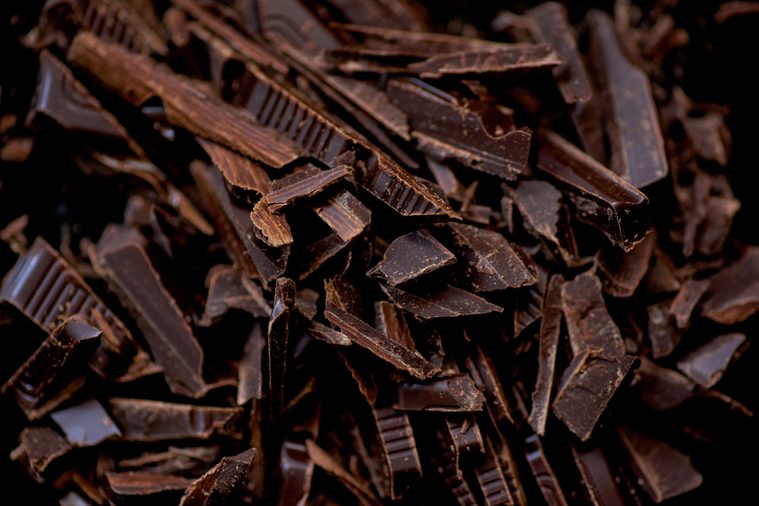
Dark chocolate
Great news for dark chocolate lovers: Research suggests it has brain-boosting powers, including enhanced cognitive function, reduced risk of dementia, and improved performance on memory activities. For example, a 2018 review in the journal Nutrients found that more than 50 mg epicatechin/day, a flavanol found in cocoa, tea, berries, and other fruits, yields cognitive benefits—especially in tasks involving memory, executive function, and processing speed in older adults (>50 years old) who took epicatechin for a duration of 28 days or longer. Find out exactly what happens to your body when you eat chocolate.
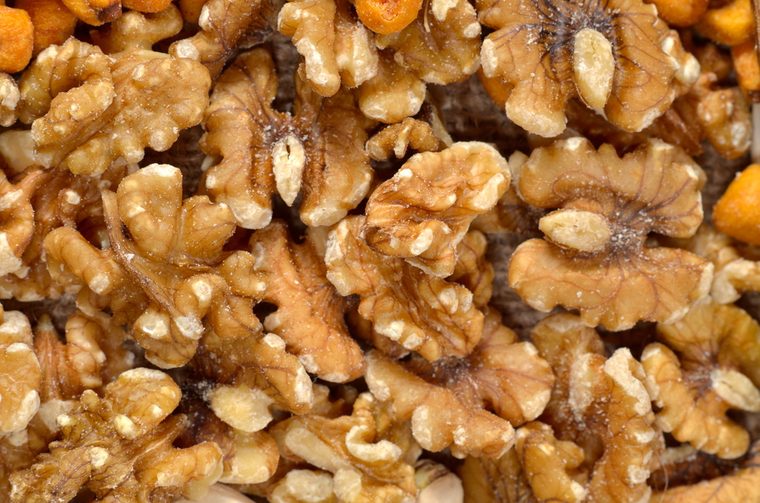
Walnuts
Many nuts are helpful for brain health, but walnuts are the only tree nut that are an excellent source of alpha-linolenic acid (ALA), a plant-based omega-3 fatty acid that’s converted to the omega-3s DHA and EPA within the body. The nuts have been linked to improved cognitive performance in adults. In a 2015 study, published in The Journal of Nutrition, Health & Aging, researchers found adults between the ages of 20 and 59 years old, who consumed higher amounts of walnuts, showed better cognitive test scores. (Keep in mind the study was funded in part by the California Walnut Council.) Here are 7 more foods loaded with omega-3 fatty acids.
Broccoli
Cruciferous vegetables like broccoli contain the compound sulforaphane, a substance that a 2017 study in the Journal of Cerebrovascular Disease & Stroke suggests could protect the brain. Broccoli also offers vitamin K, important for healthy brain function. In fact, an older study assessed the dietary intake of patients with early-stage Alzheimer’s disease and found that they got considerably less vitamin K from their diet than people without the disease. (Watch out for the worst foods for your brain that you should be avoiding.)
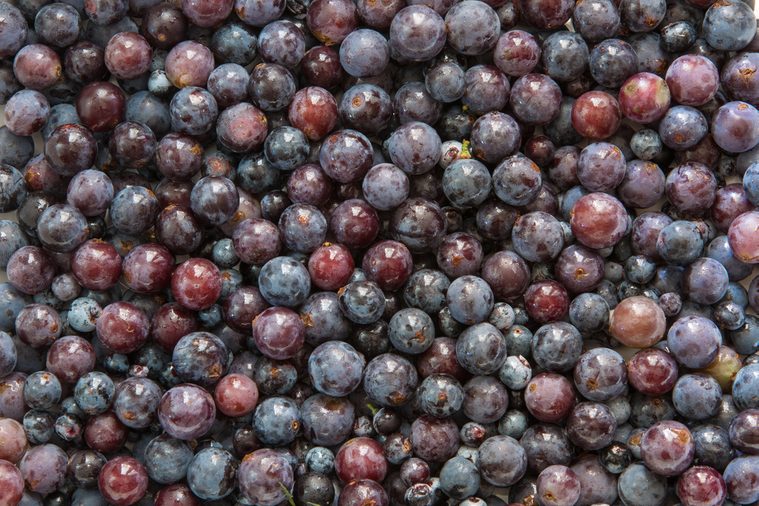
Concord grapes
Although these grapes are available for just a short time each year, you can also get their benefits through 100 percent grape juice made with Concord grapes. And the grapes can help aging adults with brain issues. In a study published in the Journal of Agricultural and Food Chemistry, for instance, older adults with age-related cognitive decline regularly drinking Concord grape juice saw a positive impact on memory function and also had increased blood flow to areas of the brain linked with memory. (Some of the study authors were employed by Welch Foods, Inc., which manufactures grape juice.) Grapes are just one of the anti-inflammatory foods that help reduce pain, so arthritis suffers will want to take note.
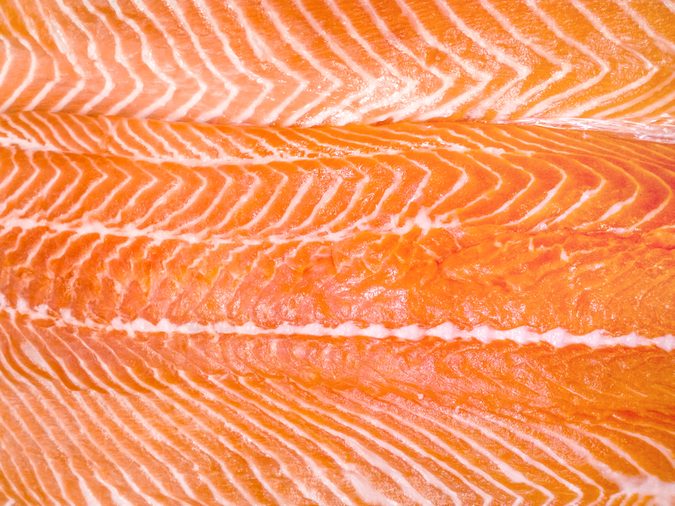
Oily fish
The brain needs plenty of omega-3 fats to stay healthy. And oily fish such as salmon, mackerel, trout, herring, sardines, and tuna offer the omega-3s EPA and DHA. Keeping the brain fueled with DHA and EPA is important since the brain is the body’s fattiest organ. DHA especially may be particularly important for brain health in older people who are not cognitively impaired, suggests a 2017 study in the Journal of Alzheimer’s Disease. And deficits in these omega-3s have been associated with neurodegenerative disorders, although more research is needed. This handy chart will help you choose fish with the highest omega-3 content.
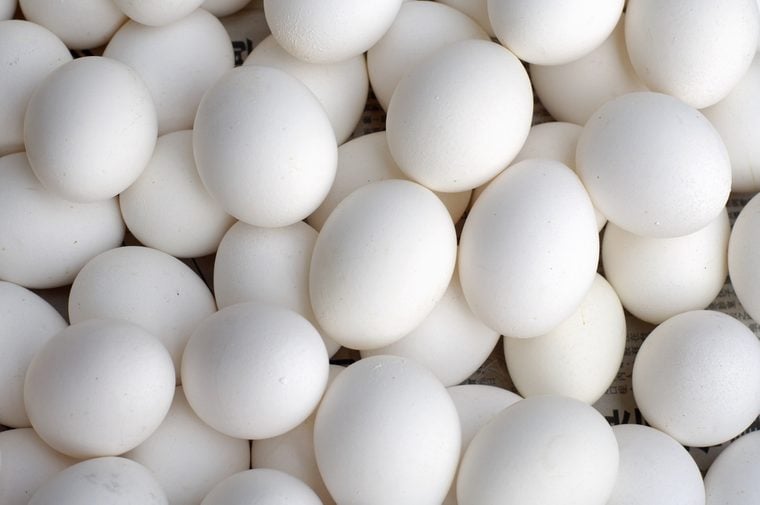
Eggs
You may have heard that the cholesterol in eggs is a concern, but it’s now thought you can safely eat an egg a day. In a 2017 study in The American Journal of Clinical Nutrition, Finnish researchers found that eating eggs may boost brain power, and much of the benefit may be due to choline, which is an essential nutrient important for metabolization. The researchers monitored the diets of about 2,500 men without dementia for about 22 years. Not only were regular egg eaters less likely to develop dementia or Alzheimer’s disease, but it was linked to better performance on cognitive tests. Enjoy eggs on hummus toast, a breakfast Panini, or one of these 55 delicious egg recipes. Here’s more information on egg nutrition too.
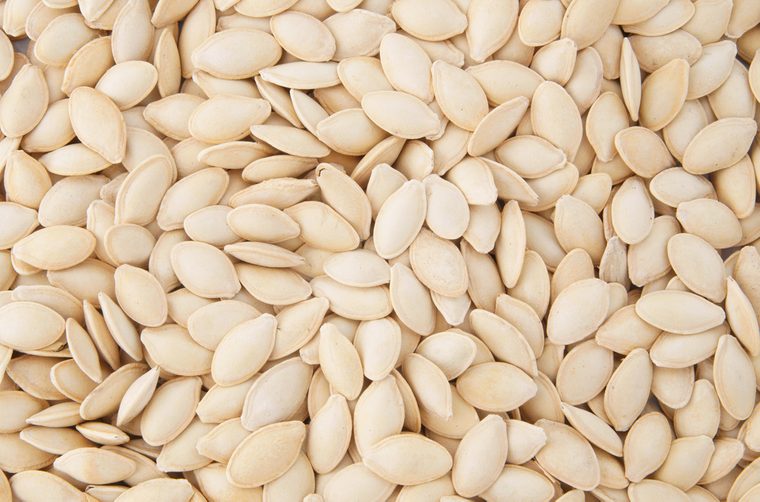
Pumpkin seeds
Seeds can be great for the brain, and pumpkin seeds may be especially helpful. These little delights offer ALA omega-3s. They also contain magnesium, which is believed to play a role in mood and brain function, as well as zinc, important for healthy brain function. A quarter cup of pumpkin seeds provides you with 15 percent of the daily value for zinc. Pumpkin seeds are just one of the 6 super seeds you should be eating.

Sage
It’s an old wives’ tale, but sage really may help sharpen the mind. According to preliminary research in the journal Advances in Nutrition, extracts or essential oils of the herb may help memory as well as mood, attention, and executive function. Sage is one of the healthy herbs that can boost your brain and also, take a look at these 10 healing herbs and spices.
Milk
This dairy drink provides choline, a nutrient important for brain health. Pregnant women really need to focus on choline because it plays a role in the early brain development of infants. In addition, a handful of observational studies have connected cognitive performance in adults with higher choline intake and plasma concentration. And some researchers believe that some natural component in milk that may help protect against insulin resistance and type 2 diabetes.
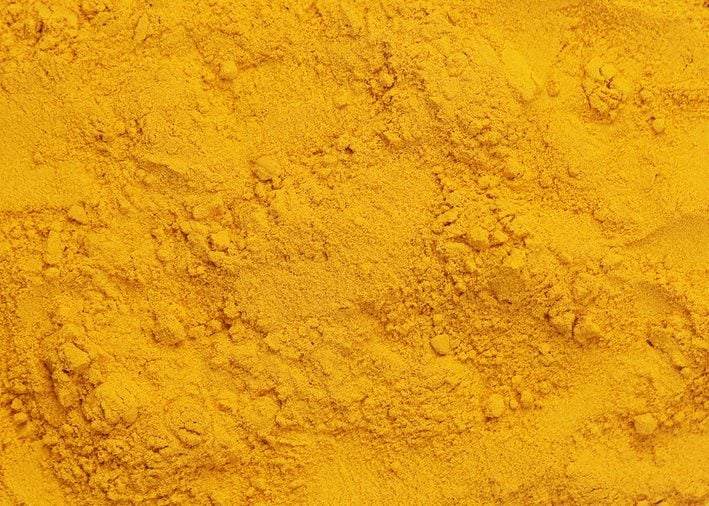
Turmeric
Turmeric has a seemingly endless list of health benefits—including helping to relieve digestive issues such as heartburn and gas. Much of the research done on turmeric has focused on curcumin, a substance in turmeric. In terms of brain health, a 2016 study in the British Journal of Nutrition found that a group of older adults receiving a curcumin supplement did not have the cognitive decline experienced by a group that didn’t take the supplement. Turmeric is thought to be an anti-inflammatory powerhouse; here’s exactly how much turmeric you need to take to reduce inflammation.
Cocoa powder
Talk about a healthy ingredient with very few calories—as long as you stick to the unsweetened variety. “Pure cocoa powder contains brain-boosting compounds, including a large number of antioxidant molecules, mainly flavonoids,” says Hultin. “The main one is epicatechin. These compounds do make it into the brain and have been linked in some studies to positive outcomes in learning and memory areas. Epicatechin is a special antioxidant and appears to improve cognition in studies. Aside from antioxidant capacity, another way cocoa could help our health is through improved cardiovascular health—better blood flow to the brain for more oxygen and nutrients.” Eating cocoa can actually help prevent and treat diabetes.
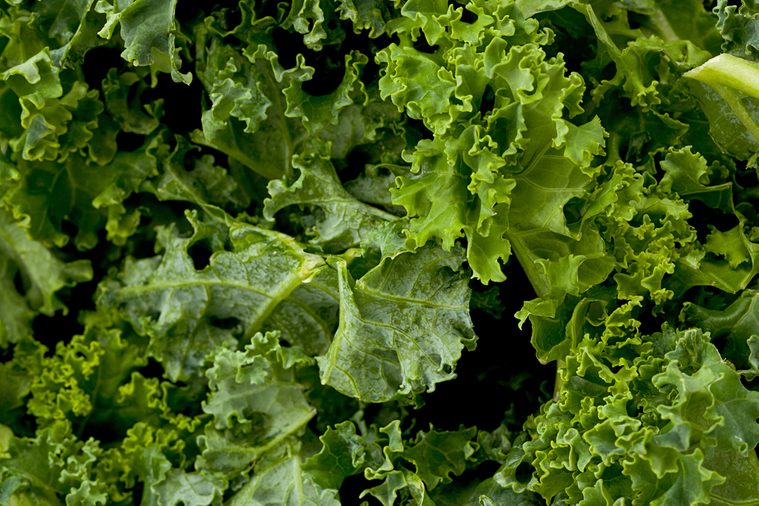
Kale
Kale has been in the spotlight for years, and it even has its own day: National Kale Day is the first Wednesday in October. Kale is packed with plenty of nutrients, including vitamin K, vitamin A, vitamin C, and the mineral manganese. And green leafy veggies like kale may help your brain: In a 2017 study in Neurology, people eating leafy vegetables daily experienced the cognitive function of people about 11 years younger, compared to people eating little to no leafy green veggies. Here are 4 creative kale recipes to try right now.
Beets
Beets contain high levels of dietary nitrates, which your body converts to nitric oxide—and that relaxes blood vessels in the body and increases blood flow to the brain. In a 2016 study in The Journals of Gerontology: Series A, older adults, with a mean age of 65.4 years, who exercised and drank beetroot juice for six weeks, experienced brain benefits. Their brain networks had a similar appearance to those of younger adults. Note that more study is needed since other research on beetroot juice and the brain is mixed. Discover why beets are a superfood vegetable you should really stop avoiding.

Olive oil
A Mediterranean-style diet is often hailed for its health benefits, including helping to protect brain health. Olive oil is made from olives, which offer health-helping polyphenols. A 2016 study in the journal Current Medicinal Chemistry suggests these polyphenols may lower risk for certain neurodegenerative diseases such as Alzheimer’s disease, Parkinson’s disease, and stroke. Use olive oil in anything from a bean salad recipe to baked chicken to a vegetarian grain bowl. Want more healthy meals for your dinner rotation? Here’s how to introduce health-boosting Mediterranean foods into your diet without even trying.
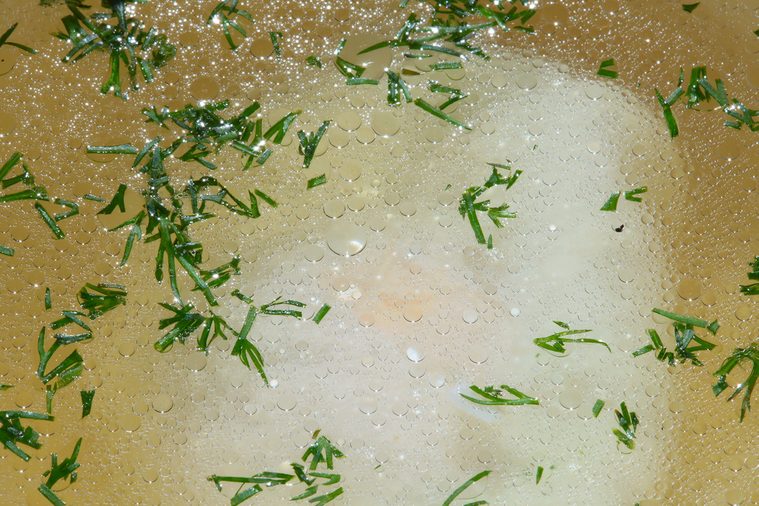
Bone broth
The hype about bone broth has grown over the past few years and much of it is warranted. To make bone broth, you take—you guessed it, bones (such as chicken bones), bake them at a low temperature in the oven until they brown, then simmer, often along with veggies like onions and herbs and seasonings. The main draw of bone broth is its high protein content, and the brain requires protein to optimally function. Add bone broth to homemade soup, or use it to sauté vegetables. Here are the best herbs for your brain.
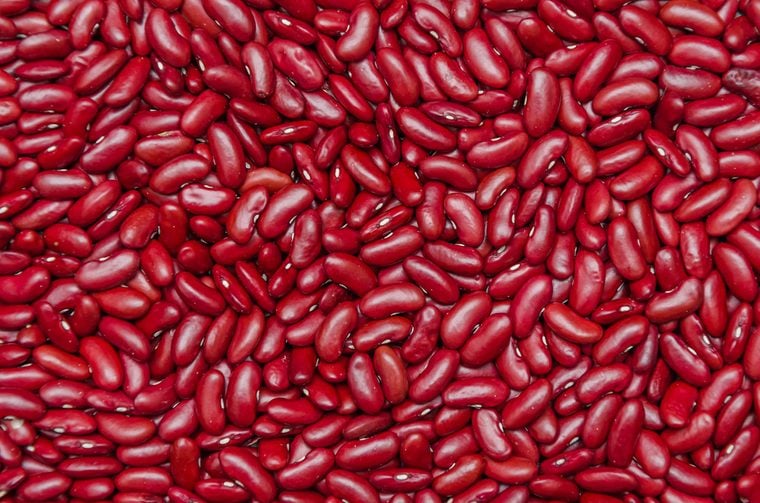
Beans
Beans offer fiber and protein, which help keep you satiated for longer to provide sustained energy. Beans also contain ALA Omega-3s to support brain growth and function; go for navy and kidney beans for a bigger ALA fix. Beans also provide carbohydrates, which are converted to glucose to fuel the brain—the organ’s preferred source of energy. Garbanzo beans, also known as chickpeas, provide magnesium, which helps keep the brain functioning optimally. Don’t miss: The 5 health benefits of beans—plus 5 surprising risks.
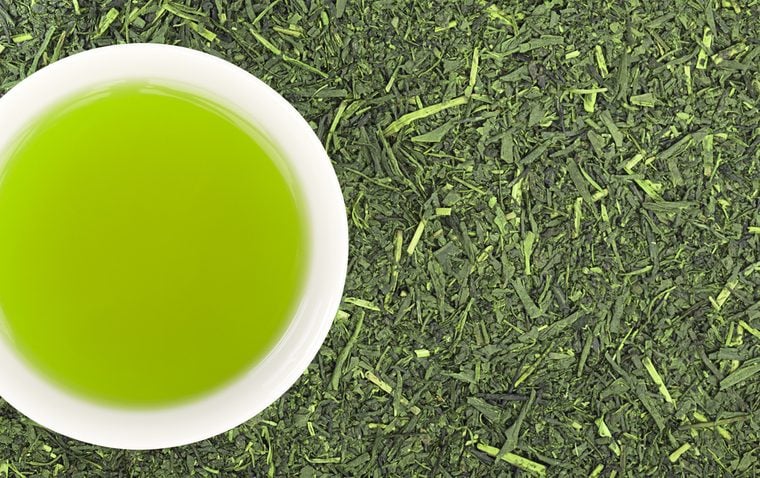
Tea
Tea is often credited with aiding weight loss and helping prevent cancer, but many scientists believe the drink is just as beneficial for the brain. Many teas contain caffeine, an instant energy booster, but tea also delivers the more calming amino acid L-theanine, which can help relax you without causing drowsiness. And drinking tea, particularly green tea, could help reduce your risk of cognitive disorders, according to a large 2017 study in the journal Oncotarget. Plus, check out these 8 benefits of tea you never knew.
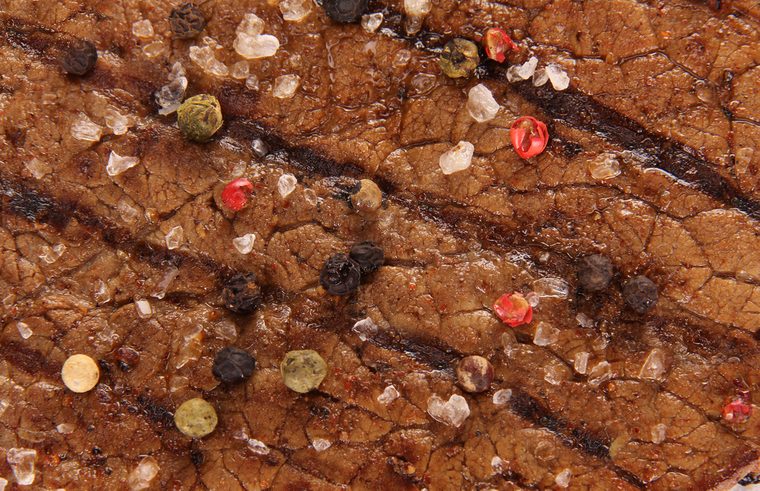
Beef
Iron is vital for good health; without it, your red blood cells could not carry oxygen to from the lungs to the body’s tissues. Beef contains the most easily absorbed type of iron, heme iron. If you don’t eat meat, the best iron-offering foods for vegetarians include eggs, beans, iron-fortified cereal, and whole grains. Just be sure to pair any plant-based sources with a food high in vitamin C, such as citrus to boost absorption. Iron deficiency often goes undiagnosed, though fatigue is a common sign.
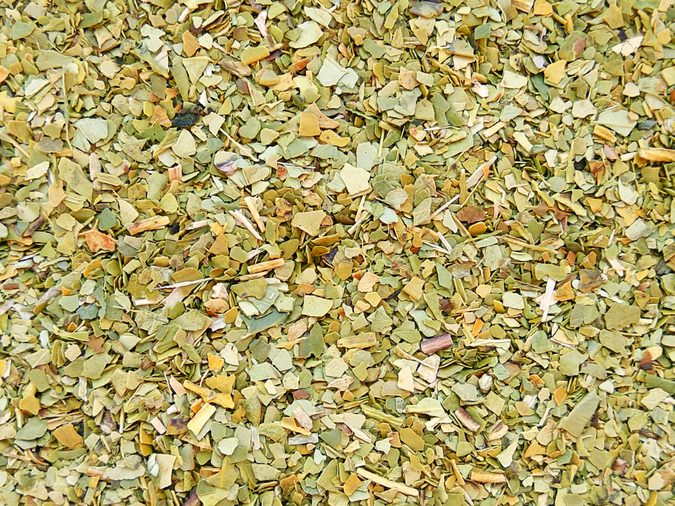
Yerba mate
In South America, yerba mate is just as common as coffee is in the U.S. The beverage mate is brewed from the leaves of yerba mate. This hot drink is believed to have a stimulant effect, which may help enhance short-term brainpower. According to yerba mate manufacturer Guayaki, yerba mate contains 24 vitamins and minerals, 15 amino acids, and an abundance of polyphenols. Besides caffeine, yerba mate provides two compounds, theobromine and theophylline, which work together to provide unique, mild stimulant effects. Enjoy a cup of yerba mate in place of your morning coffee.
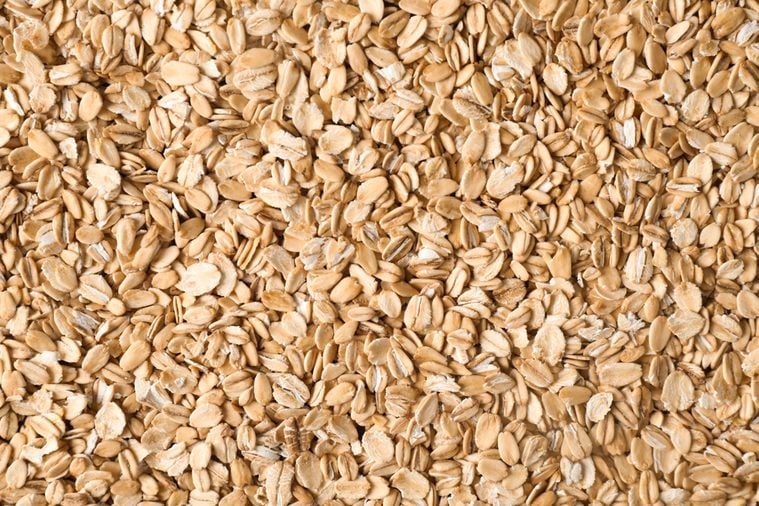
Oats
For a brain-boosting breakfast, you can’t go wrong with whole-grain oats. The brain relies on glucose for fuel, and healthy carbs like oats are a great source. Oats have an advantage over other carbohydrates in that they’re low on the glycemic index—meaning oats won’t jack up your blood sugar as quickly as some other foods. In fact, in part thanks to their fiber content, whole-grain oats are broken down slowly by the body. Your brain will reap the benefits for hours. Oats also contain B vitamins, iron, and magnesium. Best of all, oats really are a convenience food; try these 10 doctor-recommended oatmeal ideas.
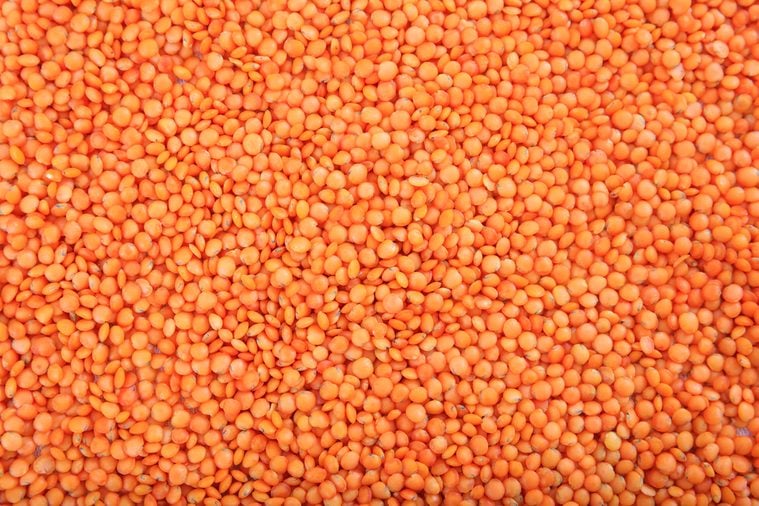
Lentils
Make lentils a staple in your soups and salads, and your brain will thank you for it. Lentils are packed with folate, a B vitamin shown to help boost cognitive performance. The vitamin can also play a role in decreasing levels of the amino acid homocysteine. This is important because too-high levels may impair brain functioning as you age. Finally, a favorite go-to for vegetarians, lentils are one of the 9 complete protein foods that aren’t meat.
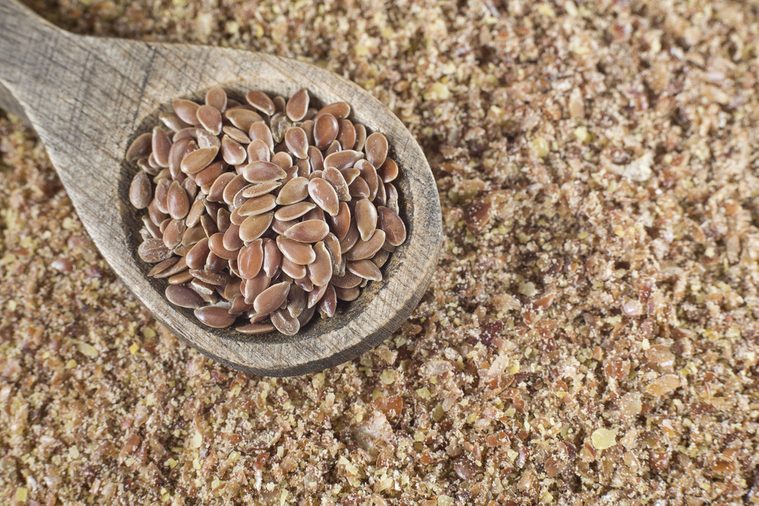
Ground flaxseed
A top source of ALA, flaxseed is a good way for vegetarians and vegans to add healthy fats to their diet. And a 2016 study in Advances in Nutrition suggests that ALA may have a positive impact on Alzheimer’s disease. The only trick is figuring out how to work the seeds in. Sprinkle a tablespoon of ground flaxseed over salad, hot or cold cereal, or in a smoothie to get your daily fix. Don’t miss the 10 healthy reasons you should be eating more flaxseed.


